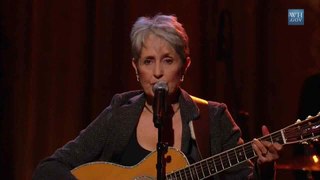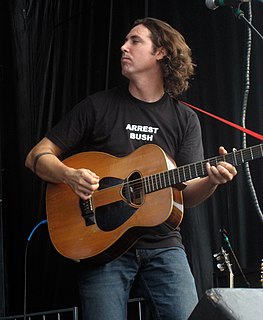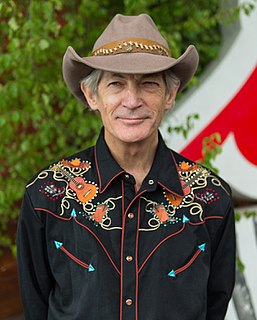
Peter Seeger was an American folk singer and social activist. A fixture on nationwide radio in the 1940s, he also had a string of hit records during the early 1950s as a member of the Weavers, most notably their recording of Lead Belly's "Goodnight, Irene", which topped the charts for 13 weeks in 1950. Members of the Weavers were blacklisted during the McCarthy Era. In the 1960s, Seeger re-emerged on the public scene as a prominent singer of protest music in support of international disarmament, civil rights, counterculture, and environmental causes.

"We Shall Overcome" is a gospel song which became a protest song and a key anthem of the Civil Rights Movement. The song is most commonly attributed as being lyrically descended from "I'll Overcome Some Day", a hymn by Charles Albert Tindley that was first published in 1900.

Ruth Crawford Seeger, born Ruth Porter Crawford, was an American modernist composer active primarily during the 1920s and 1930s and an American folk music specialist from the late 1930s until her death. She was a prominent member of a group of American composers known as the "ultramoderns," and her music influenced later composers including Elliott Carter.
The Weavers were an American folk music quartet based in the Greenwich Village area of New York City. They sang traditional folk songs from around the world, as well as blues, gospel music, children's songs, labor songs, and American ballads, and sold millions of records at the height of their popularity. Their style inspired the commercial "folk boom" that followed them in the 1950s and 1960s, including such performers as The Kingston Trio, Peter, Paul, and Mary, The Rooftop Singers, The Seekers, and Bob Dylan.

Charles Louis Seeger, Jr. was an American musicologist, composer, teacher, and folklorist. He was the father of the American folk singers Pete Seeger (1919–2014), Peggy Seeger, and Mike Seeger (1933-2009); and brother of the World War I poet Alan Seeger (1888-1916).

Margaret "Peggy" Seeger is an American folksinger. She is also well known in Britain, where she has lived for more than 30 years, and was married to the singer and songwriter Ewan MacColl until his death in 1989.
Mike Seeger was an American folk musician and folklorist. He was a distinctive singer and an accomplished musician who played autoharp, banjo, fiddle, dulcimer, guitar, mouth harp, mandolin, dobro, jaw harp, and pan pipes. Seeger, a half-brother of Pete Seeger, produced more than 30 documentary recordings, and performed in more than 40 other recordings. He desired to make known the caretakers of culture that inspired and taught him.

Alan Seeger was an American poet who fought and died in World War I during the Battle of the Somme, serving in the French Foreign Legion. Seeger was the brother of Charles Seeger, a noted American pacifist and musicologist. He is best known for the poem I Have a Rendezvous with Death, a favorite of President John F. Kennedy. A statue representing him is on the monument in the Place des États-Unis, Paris, honoring fallen Americans who volunteered for France during the war. Seeger is sometimes called the "American Rupert Brooke."

Elizabeth "Libba" Cotten was an American blues and folk musician, singer, and songwriter.

We Shall Overcome: The Seeger Sessions is the fourteenth studio album by Bruce Springsteen. It peaked at number three on the Billboard 200 and won the Grammy Award for Best Traditional Folk Album at the 49th Grammy Awards.

The Bruce Springsteen with The Seeger Sessions Band Tour, afterward sometimes referred to simply as the Sessions Band Tour, was a 2006 concert tour featuring Bruce Springsteen and The Sessions Band playing what was billed as "An all-new evening of gospel, folk, and blues", otherwise seen as a form of big band folk music. The tour was an outgrowth of the approach taken on Springsteen's We Shall Overcome: The Seeger Sessions album, which featured folk music songs written or made popular by activist folk musician Pete Seeger, but taken to an even greater extent.
Al Seeger, nicknamed "The Quiet Storm", is a boxer from the United States.

"Where Have All the Flowers Gone?" is a modern folk-style song. The melody and the first three verses were written by Pete Seeger in 1955 and published in Sing Out! magazine. Additional verses were added in May 1960 by Joe Hickerson, who turned it into a circular song. Its rhetorical "where?" and meditation on death place the song in the ubi sunt tradition. In 2010, the New Statesman listed it as one of the "Top 20 Political Songs".

Tao Rodríguez-Seeger is an American contemporary folk musician. A founder of The Mammals, he is the grandson of folk musician Pete Seeger. He plays banjo, guitar, harmonica and sings in English and Spanish.
Seeger is the surname of various people, including an extended family of American musicians.
Pete Seeger: The Power of Song (2007) is a documentary film about the life and music of the folk singer Pete Seeger. The film, which won an Emmy Award, was executive produced by Seeger's wife, filmmaker Toshi Seeger, when she was 85 years old.
The Sessions Band is an American musical group that has periodically recorded and toured with American rock singer-songwriter Bruce Springsteen in various formations since 1997.
Toshi Seeger was an American filmmaker, producer and environmental activist. A filmmaker who specialized in the subject of folk music, Toshi's credits include the 1966 film Afro-American Work Songs in a Texas Prison and the Emmy Award-winning documentary Pete Seeger: The Power of Song, released through PBS in 2007. In 1966, Seeger and her husband, folk-singer Pete Seeger, co-founded the Hudson River Sloop Clearwater, which seeks to protect the Hudson River and surrounding wetlands. Additionally, they co-founded the Clearwater Festival, a major music festival held annually at Croton Point Park in Westchester County, New York.
American Folk Songs for Children is a studio album released by Pete Seeger in 1953 by Folkways Records. It was Seeger's first solo album.

Ruth Mae Taubert Seeger was an American athlete and coach. She was the first woman to be chosen for the United States track and field team for the 1957 World Games for the Deaf.












